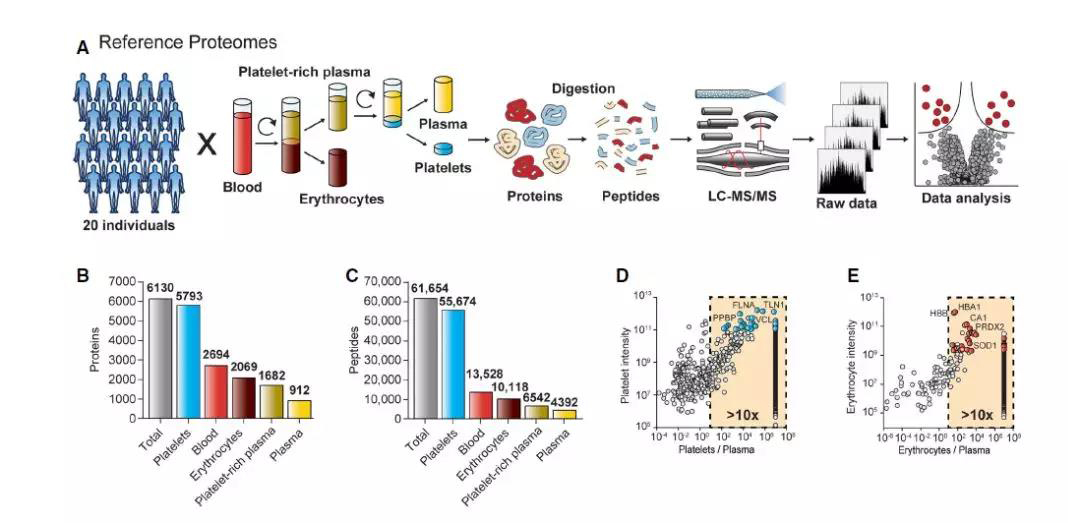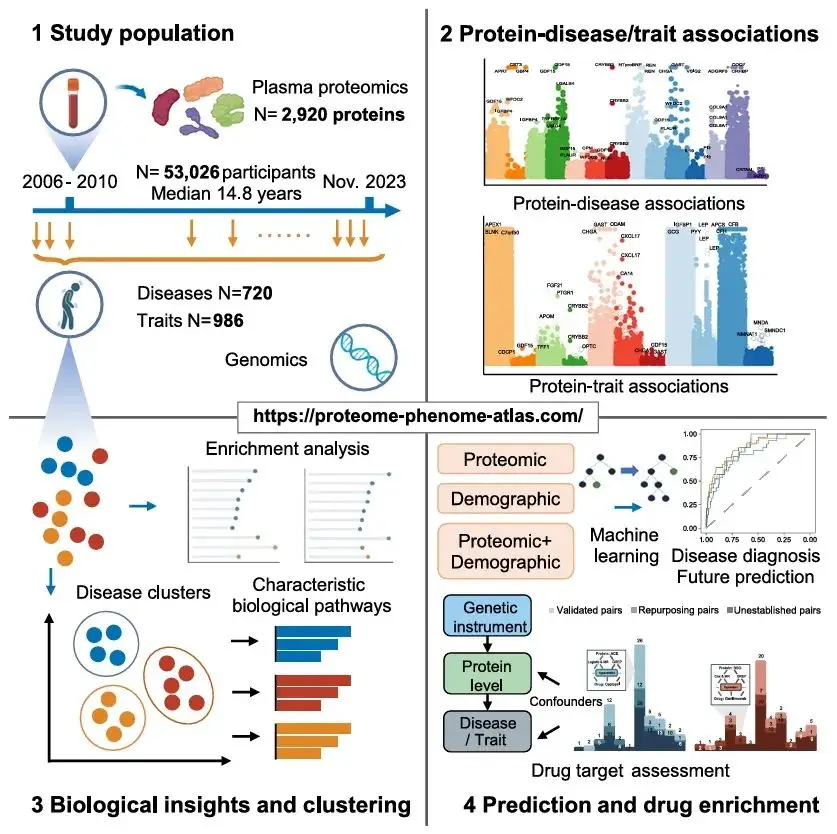Plasma Proteomics Analysis Service
The plasma proteomics analysis service utilizes high-sensitivity mass spectrometry technology to comprehensively analyze the types, abundance, and modification states of proteins in plasma, providing critical data support for disease mechanism research and biomarker discovery. The plasma proteome is the most complex human proteome, associated with nearly all cells, tissues, and organs. Plasma proteomics is the scientific study of the composition, structure, function, and dynamic changes of proteins in plasma. As a "liquid biopsy" sample, plasma contains a wealth of protein information that reflects physiological and pathological states of the body. Therefore, plasma proteomics plays a crucial role in early disease diagnosis, treatment monitoring, and prognosis evaluation.
Plasma proteomics plays a key role in biomarker discovery. High-throughput proteomics technologies, such as mass spectrometry analysis, enable researchers to identify and validate protein biomarkers associated with specific diseases. For example, in cancer research, plasma proteomics analysis service can help uncover tumor-specific proteins or protein alterations in the tumor microenvironment, providing valuable insights for early cancer diagnosis. Additionally, this approach can be used to monitor disease progression and assess treatment efficacy by detecting changes in the levels of specific plasma proteins, ultimately helping to evaluate therapeutic outcomes and patient prognosis.
With technological advancements, the application of plasma proteomics analysis service in precision medicine is expanding rapidly. By integrating bioinformatics and artificial intelligence technologies, researchers can extract deeper insights from plasma proteome data, identifying novel biomarkers and disease mechanisms. This not only enhances the accuracy of disease diagnosis and treatment efficacy but also offers new approaches for personalized medicine. In summary, plasma proteomics is a highly promising research field that continues to provide valuable scientific insights and technological advancements for disease prevention, diagnosis, and treatment.

Geyer P E. et al. EMBO Molecular Medicine, 2019.
Figure 1. Application of Plasma Proteomics in Disease Research.
Services at MtoZ Biolabs
MtoZ Biolabs offers plasma proteomics analysis service by integrating cutting-edge mass spectrometry platforms (such as the Thermo Fisher Orbitrap Fusion Lumos) with nano-liquid chromatography (Nano-LC) systems. Our high-sensitivity and high-resolution proteomic solutions enable precise protein identification and quantification, covering three core approaches:
1. Mass Spectrometry-Based Plasma Proteomics Analysis Service
Mass spectrometry-based plasma proteomics is one of the most commonly used techniques in plasma proteomics research. By measuring the mass of proteins or peptides, this method enables the identification of protein types and quantities. Mass spectrometry technology is characterized by high throughput, high sensitivity, and high accuracy, allowing the identification of thousands of proteins within complex plasma samples.
2. Two-Dimensional Electrophoresis-Based Plasma Proteomics Analysis Service
Besides mass spectrometry, this is a traditional proteomics research method that separates proteins based on two dimensions: isoelectric point (pI) and molecular weight. This approach enables protein separation and identification and is particularly suitable for studying differential protein expression.
3. Liquid Chromatography-Based Plasma Proteomics Analysis Service
Liquid chromatography (LC) separates proteins or peptides in plasma samples and is commonly combined with mass spectrometry (LC-MS/MS) to improve the accuracy and sensitivity of protein identification.
In addition, mass spectrometry (MS) is the most commonly used technique in plasma proteomics research, particularly liquid chromatography-tandem mass spectrometry (LC-MS/MS). This method enables the accurate identification and quantification of a large number of proteins in plasma samples. By analyzing protein expression patterns, variations, and interactions, researchers can obtain valuable insights into disease mechanisms, biomarker discovery, and therapeutic targets.
Service Advantages
1. Advanced Analytical Platform
MtoZ Biolabs has established a cutting-edge plasma proteomics analysis service platform, ensuring reliable, rapid, and high-precision analytical services.
2. Transparent Pricing
Our pricing structure is transparent, with no hidden or additional fees.
3. High-Quality Data
Our services provide in-depth data coverage with rigorous quality control. The AI-driven bioinformatics platform integrates all plasma proteomics data, offering clients a comprehensive proteomics report.
4. Customized Research Solutions
MtoZ Biolabs tailors services to meet specific research needs, ensuring personalized experimental solutions.
Applications
1. Cancer Diagnosis
Plasma proteomics enables early detection and diagnosis of tumors.
2. Cardiovascular Disease Research
In cardiovascular disease research, plasma proteomics can identify novel biomarkers for predicting disease risk and evaluating treatment efficacy.
3. Neurological Disorders
By measuring brain proteins in plasma, plasma proteomics analysis service can aid in the diagnosis and assessment of neurological disorders such as Alzheimer's disease and Parkinson's disease.
4. Disease Risk Prediction Models
Plasma proteomics contributes to the development of predictive models for disease risk assessment.
5. Personalized Risk Assessment
By analyzing an individual's plasma proteome profile, personalized disease risk assessment can be provided, guiding prevention and intervention strategies for patients.
6. Drug Target Discovery
Plasma proteomics analysis service helps identify novel drug targets.
7. Drug Efficacy Monitoring
Monitoring plasma protein variations enables assessment of drug efficacy and patient responses, providing insights for dosage adjustments and therapy optimization.
8. Understanding Disease Mechanisms
Plasma proteomics analysis service can reveal the molecular mechanisms of disease onset, helping researchers understand the pathways of disease progression.
9. Precision Medicine
Plasma proteomics provides essential tools and methods for precision medicine, enabling the development of personalized treatment plans based on a patient's proteomic profile.
10. Disease Stratification & Prognostic Evaluation
Through plasma proteomic analysis, diseases can be more precisely stratified, patient prognosis can be assessed, and clinical decision-making can be guided.
Case Study
1. Plasma Proteomic Atlas in 53,026 Adults Across Health and Disease
Through large-scale analysis of the plasma proteomes of 53,026 adults, a comprehensive plasma proteomic atlas covering 1,706 human diseases and traits was constructed. Utilizing machine learning and big data technologies, researchers identified potential diagnostic and predictive biomarkers, as well as 37 opportunities for drug repurposing and 26 potential therapeutic targets with favorable safety profiles. This study provides an open-access proteome-phenotype resource, contributing to the elucidation of disease biology and accelerating the development of disease biomarkers, predictive models, and therapeutic targets.

Deng, Y T. et al. Cell, 2024.
Figure 2. Research Roadmap.
MtoZ Biolabs, an integrated Chromatography and Mass Spectrometry (MS) Services Provider, provides advanced proteomics, metabolomics, and biopharmaceutical analysis services to researchers in biochemistry, biotechnology, and biopharmaceutical fields. Our ultimate aim is to provide more rapid, high-throughput, and cost-effective analysis, with exceptional data quality and minimal sample consumption. Free project evaluation, welcome to learn more details!
MtoZ Biolabs, an integrated chromatography and mass spectrometry (MS) services provider.
Related Services
How to order?







